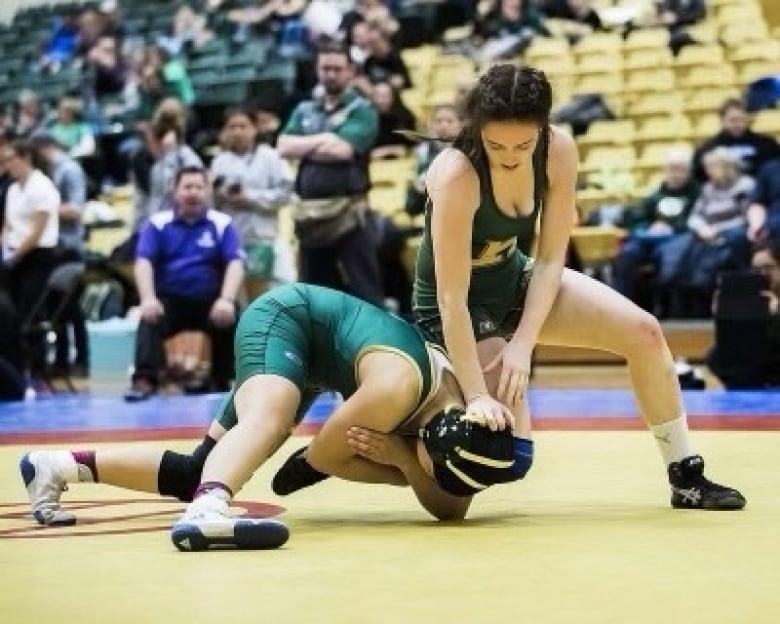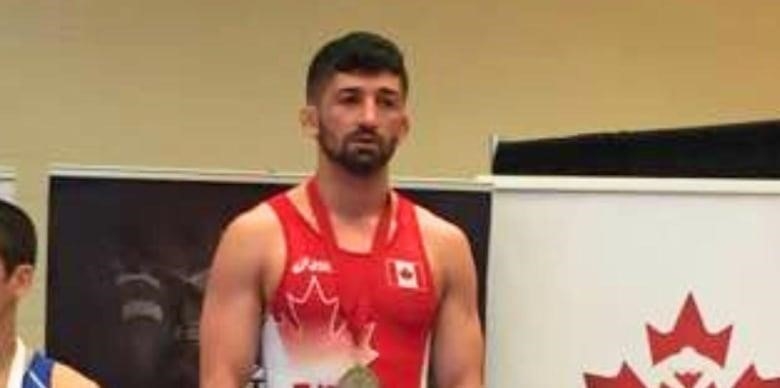Organization didn’t have a policy or plan for how to handle complaints
This story talks about sexual assault, so be warned.
A former provincial championship wrestler who came forward claiming her coach sexually assaulted her at a party when she was a teenager is disappointed with what she describes as the “ridiculous” Canadian complaints process, saying it left her afraid for the safety of other young athletes.
Last month, Madison Payette, who is now 26, found out that her old coach, Aso Palani, had been suspended because it was likely that he had attacked her when she was 17.
The coach was suspended for three years, and half of that time has already passed. In February 2025, he will be able to go back to working with young people.
“It’s ridiculous,” Payette told CBC in an exclusive interview.
“You’re going to say that, based on the odds, it did happen… but you’re only giving him three years? And you’re going to let him go and keep working with young people?
“It’s absolutely shocking.”
During the hearing, Palani, who is 36 years old, “vehemently” denied the sexual assault claim. He didn’t agree to an interview, and he’s going to appeal the decision.
Even though the panel found in her favor, Payette says her case shows the hard truth of Canada’s patchwork sports discipline system, which is still different from place to place even though the public has been calling for improvements for years.
Payette says that despite all the talk about safety in sports, the reality for athletes who step forward is still much harder.
Palani’s name was added to a list of suspended coaches by Wrestling Canada in March 2022, but the full decision from the B.C. Wrestling Association, which explained why he was suspended, was not made public for seven weeks, even though Payette’s legal team asked for it over and over again.
The decision was posted online on Tuesday, the day after CBC News asked to talk to Wrestling Canada.
In a statement, the national organization said that “there was never a decision not to publish the full details of the suspension.”
Decision talks about party nigh
Payette started wrestling when she was in high school in Edmonton, where she grew up. She went on to compete for the province, the country, and the University of Alberta, all while being coached by her father.
She met Palani when he started coaching at the Edmonton Wrestling Club three days a week in 2012. Palani was also on the Canadian national team and signed up with a wrestling club in B.C. at the time.
Payette said that Palani used his good name to get her to trust him.
“He was giving me all the attention a 17-year-old girl could have wanted. He told me that I was unique. He said I was very wise for my age… you want to think all of these things are true.”
Payette went to a house party in Edmonton that was put on by college athletes in December 2013. This was just a few weeks after she turned 17. She said that Palani went to the party as well, which was “unusual” for a coach.

The rest of the group left to go to a nearby bar, according to the discipline decision. Payette stayed behind with Palani because she was still too young to drive.
Payette told the disciplinary panel that Palani gave her alcohol, led her to a bedroom, took off all of her clothes, and forced her to have oral sex with him.
She said that the fight stopped when two male college athletes left the bar early.
“I was seventeen. I really hadn’t been on a date before. I didn’t know how to make a relationship work. Then there’s this grown-up who’s been put on a pedestal. He’s kind of like your head coach. “He’s on the national team,” Payette said.
Palani said at the hearing that he did not go to the party in question and that he did not talk to Payette that night. He said he didn’t date Payette when he was her coach.
CBC asked Palani several times for a comment, but he never answered.

The Edmonton Police confirmed that Payette had filed a complaint, but they said the case is now closed. Palani has not been charged with a crime in this case.
In its decision, the disciplinary panel criticized Palani for trying to attack Payette’s character and credibility “on multiple fronts” during the hearing. In the decision, it said that the coach and his lawyer questioned her mental health and whether she was too drunk to remember what happened.
The decision says that Palani also said that “girls who cry on the witness stand are not reliable.”
No policies in plac
Payette decided to file a complaint nine years after the party. Her work as a high school teacher and all the talk about safe sports in Canada gave her what she called a sense of moral responsibility.
Payette said that the bodies in charge of wrestling were not ready to deal with her complaint.
“Nobody knew what to do. Still, they don’t know what to do. It’s a big surprise. If I’m being honest … “It’s scary, to be honest,” she said.
“As an athlete, I shouldn’t have to go ask people how to get these resources…. I should be forced to learn it.”
Payette ran into a problem that is common in Canadian sports: wherejurisdiction and responsibilities lie.

She first told Wrestling Canada about her problem in January 2022, but even though Palani is on the national team, officials said they didn’t have the power to do anything about it. Payette thought that the wrestling association in Alberta would handle the complaint because that is where she and Palani trained and where the party took place.
After three months of back and forth, the B.C. Wrestling Association (BCWA) agreed to look into Payette’s complaint because Palani was a member of the Burnaby, B.C., club when the party happened.
The hearing finally happened in April of this year, almost a year and a half after Payette first spoke out.
“The hardest part was waiting,” Payette said.
When Payette’s complaint was sent to BCWA, the organization didn’t have a code of conduct or rules about how to handle discipline and complaints.
The organization said in a statement that it had “recently updated” its procedures and gave a link toA Plan for Discipline and ComplaintsDated June 1, which was after Payette’s case was over by several weeks.
According to that policy, from now on, sexual abuse of a minor will “carry a presumptive sanction of permanent ineligibility.”
“We’re sure that it’s our job to make sure that all athletes can compete in a safe place, and we’re committed to improving any safe sport programs that are already in place.” “Like I said above, we recently changed some of our policies to reflect the best practices of today,” a representative wrote in an email.
Athlete thought he would be banned for life
After the hearing, Payette said that she thought some parts of the process went well. For example, BCWA chose a third-party panel, the panelists believed her story, and they understood how much abuse can hurt young athletes.
She said, “Finally, this group of people understood me.”
But as she read the ruling, she saw that Palani would not be banned forever.
“Then, at the end of the ruling, they tell you their decision, and I was completely shocked.
“I can’t even put into words how I feel. At that moment, my stomach dropped. It seemed like it was all for nothing.”
Payette said that, based on national rules on the subject, she expected a lifetime ban.
In Canada, the Universal Code of Conduct (UCCMS) is a set of rules for sports organizations that get money from the government. Under that code, anyone who hurts a child should be “presumed to be permanently ineligible” as a result.
WATCH | A former top fencer wants a “public inquiry into the culture of sports in Canada”:
But BCWA doesn’t have to follow the code because the government doesn’t give it any money. The decision did not say why the three-year term was chosen by the panel.
In its statement, BCWA said it couldn’t say anything about the penalty because the panel and its members were “entirely independent” from the organization.
Palani owns a wrestling gym in Surrey that is based in a high school. During the hearing, his lawyers said that he had been training athletes but had not done anything related to wrestling while he was suspended.
“My question was how many people have to be sexually assaulted by him for him to be banned for life,” Payette said.
Local vs. federal level 
Palani has never been charged with a crime, but this case shows an ongoing CBC News and Sports story. investigation That has shown that between 1998 and 2022, nearly 300 coaches, mostly at the local level, were found guilty of committing a sexual offense against a minor in their care. This happened in many different sports, provinces, and jurisdictions.
Even though most crimes happen at the local level, most of the recent actions taken by the government have been in Ottawa.
Last year, the federal government gave $16 million to create theThe Sport Integrity Commissioner’s Office(OSIC), which is a separate office that runs the UCCMS and is in charge of looking into athlete complaints in Canada. The government said that sport groups that get money from the federal government but don’t sign up by April could lose their money.
By the deadline, Wrestling Canada had signed up.
At the provincial and territorial level, governments have until the end of the year to either join OSIC or set up their own independent bodies to properly investigate complaints of misconduct.
Ottawa hasn’t said yet what might happen if that deadline isn’t met.
Even though she had been hurt, Payette still thought it was the right thing to do.
“If B.C. Wrestling isn’t going to protect me and Wrestling Canada isn’t going to protect their athletes, then I’ll do everything I can to make sure everyone knows and no one puts their children or themselves in a situation like I was in with him,” she said.
“It’s my responsibility.”
Is there more to this? Email [email protected] with information.
